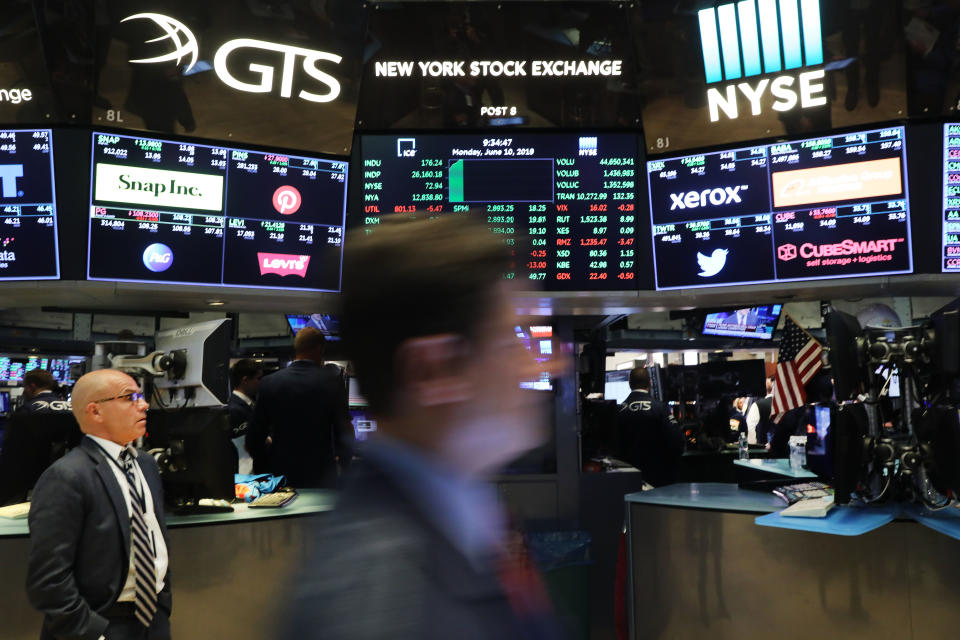Stocks edge up at the start of a busy week for central banks
U.S. stocks ticked up Monday as investors awaited monetary policy decisions from several major central banks later this week.
Meanwhile, global trade relations remained sharply in focus as companies took to Washington, D.C., to kick off public hearings over the Trump administration’s proposed additional tariffs on Chinese goods.
The S&P 500 (^GSPC) rose 0.09%, or 2.69 points, as of market close. The Dow (^DJI) rose 0.09%, or 22.92 points, while the Nasdaq (^IXIC) rose 0.62%, or 48.37 points.
Treasury yields in the U.S. were mixed, with the more policy sensitive yields on the short end of the curve edging higher.
This week, central bankers of the Federal Reserve, Bank of England and Bank of Japan each set meet to meet and deliver their latest monetary policy decisions.
Central bankers around the world have tilted in a more dovish direction amid looming concerns of global trade and a broad economic slowdown. Market watchers widely expect Federal Open Market Committee members to use their June meeting and presser as an opportunity to adjust their rhetoric and set the stage for a near-term rate cut.
[Read more: FOMC preview: Threading the needle on rate changes for July]
Crude oil prices (CL=F) slid back down as traders turned focus back to supply and demand concerns. Prices for the commodity jumped at the end of last week after attacks on two tankers in the Gulf of Oman,
Elsewhere, representatives from hundreds of companies will meet in Washington, D.C., on Monday for the first of seven days of public hearings to discuss the Trump administration’s proposed tariffs on $300 billion worth of Chinese imports. Duties on $250 billion worth of goods in China are currently in effect.
Over the past month, companies from Walmart (WMT) to Microchip Technology (MCHP) to Deere & Company (DE) have called out the potential impact to global demand, production and inventories, and consumer prices that would come into play as a result of additional tariffs. Last week, 600 companies came together to sign a letter imploring the White House to remove tariffs on Chinese imports on put an end to the trade war.

While many market participants believe the next catalyst to kickstart stalled trade talks between the U.S. and China will come when Trump and Xi Jinping attend the G20 summit in Japan later this month, members of the Trump administration have demurred.
Over the weekend, Commerce Secretary Wilbur Ross downplayed the prospects of a deal emerging from the summit, but suggested future negotiations would help end the impasse, he told the Wall Street Journal.
“Even real shooting wars end with negotiation, and this will ultimately end in negotiations,” Ross said, according to the WSJ. “Whether that will be in 10 minutes, 10 weeks, 10 months or longer, it’s not possible to judge.”
Trump’s trade war broadened out over the weekend as India slapped tariffs on U.S. goods as a retaliatory measure for Washington withdrawing the Southeast Asian country’s preferential trade status. The tariffs of as high as 70% on 28 U.S. products went into effect Sunday.
STOCKS
Pfizer (PFE), the largest U.S. drugmaker, announced Monday that it would acquire Array Biopharma (ARRY) in a $10.64 billion cash deal aimed at boosting its cancer therapies portfolio. Pfizer said it would pay Array stockholders $48 in cash per share outstanding and would fund the transaction with debt and existing cash. Array has assets including Braftovi and Mektovi, each approved for use in treating metastatic melanoma. The deal is expected to be completed in the second half of the year, and add to earnings beginning in 2022, Pfizer said.
Alibaba (BABA) has proposed a one-to-eight stock split, boosting shares outstanding in advance of a reported Hong Kong listing later this year. The move would increase the number of ordinary shares to 32 billion, and would take effect no later than July 2020. Last week, Alibaba was reported to have been mulling an initial public offering in Hong Kong that would raise as much as $20 billion.
ECONOMY
The New York Federal Reserve’s Empire State manufacturing index posted its largest decline on record in June as manufacturing activity in the region stalled. The headline index fell by 26 points to negative 8.6, far below the reading of positive 11.0 consensus economists expected, and the 17.8 reading from May. June’s report reflected the first negative reading for the index in more than two years.
Weakness in the survey was broad-based, with the key new-orders index sinking 21.7 points to negative 12 in June. The index tracking number of employees fell 8 points to negative 3.5, the first negative result in more than two years. Indices that reflected the six-month outlook “indicated that firms were less optimistic about future conditions than they were last month,” according to the report.
Some economists, however, speculated that the record drop in the index was the result of a temporary flare-up in fears amid the previously announced threats of tariffs on imports from Mexico, which have since been withdrawn.
“This looks terrible, but it won’t last. The survey is conducted during the first 10 days of the month so it likely reflects the peak of Mexico tariff fear,” Ian Shepherdson of Pantheon Macroeconomics wrote in a note Monday. “President Trump tweeted the tariff threat on May 30 and abandoned it June 7. During that period, businesses appear to have panicked.”
Read the latest financial and business news from Yahoo Finance
—
Emily McCormick is a reporter for Yahoo Finance. Follow her on Twitter: @emily_mcck
Read more from Emily:
Tech companies like Lyft want your money – not ‘your opinion’
Levi Strauss shares jump more than 30% above IPO price at open
Facebook sued by Trump administration for alleged ‘discriminatory’ ad practices
Boeing 737 Max groundings ‘pressure’ U.S. economic data: Wells Fargo
Follow Yahoo Finance on Twitter, Facebook, Instagram, Flipboard, LinkedIn, and reddit.

